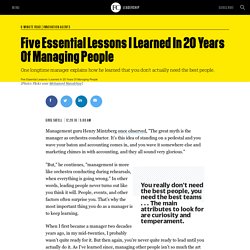

Motivational techniques for managers. 3 Simple Improvement Techniques Most Managers Learn Too Late. Management is like driving: Managers tend to rate their skills higher than average.

But from surveys, we know that there is a disconnect between this perceived skill and actual skill. This disconnect is a problem, because when we believe we're already good at something we have little motivation to grow or change. After all, the return on the time invested isn't as great as it is in some other skill area -- or so our thinking goes. With this mindset, we invest in other elements of our business -- marketing, technology, competition -- and it pays off. We see more rapid change where we focus our time and energy, and our management skills lag behind. When it comes to managing people, most of us are winging it. It turns out that management is harder than it looks. Here is the scenario that plays out daily in workplaces everywhere. It doesn't help that few of us get any direct, supportive, actionable feedback.. What separates great managers from everyone else is not natural talent.
Six Ways to Be a Better Manager. Do good managers look for consensus and strive to predict the future?

Not according to William Barnett, a professor of business leadership at Stanford Graduate School of Business. “Humans fear being a fool much more than they hope to be a genius,” he said during a recent discussion at the business school. Rather than risk looking foolish, employees may opt to support a consensus view or fear to voice controversial ideas, and that can lead to poor strategic choices for a business, he says. Barnett says that if people in your organization are afraid that breaking from the consensus is bad for their careers, it’s a sign that you need to rethink your approach. He shared this and other insights on managing and building successful companies during a Stanford GSB Faculty Lecture on Oct. 24.
Search for the Foolish Geniuses make mistakes. By foolishness, Barnett really means ideas that fall out of the consensus view. Look for Arguments, Not Consensus Connect the Dots Looking Backward. Five Essential Lessons I Learned In 20 Years Of Managing People. Management guru Henry Mintzberg once observed, "The great myth is the manager as orchestra conductor.

It’s this idea of standing on a pedestal and you wave your baton and accounting comes in, and you wave it somewhere else and marketing chimes in with accounting, and they all sound very glorious. " "But," he continues, "management is more like orchestra conducting during rehearsals, when everything is going wrong. " In other words, leading people never turns out like you think it will.
People, events, and other factors often surprise you. How to Manage Managers. When you’re managing managers, your responsibilities are two-fold: you need to make sure they’re producing good work (as with any employee) and that they’re effectively supporting their teams.

Fortune. The Leadership Insiders network is an online community where the most thoughtful and influential people in business contribute answers to timely questions about careers and leadership.

Today’s answer to the question: How do you prepare for a management role? Is written by Ryan Harwood, CEO of PureWow. How to Know If Someone Is Ready to Be a Manager. When you’re hiring a new manager, the stakes are high.

You need someone who can effectively lead people, manage a budget, liaise with upper management — and, usually, do it all from day one. But what if a potential hire doesn’t yet have a track record in doing all of the above? Would you hire or promote a star player into a management role if they’ve never managed anyone? To gain some perspective on how to handle this kind of challenge, I reached out to some management experts for their point of view on the skills and personalities to look for. An important thing to look for in this situation is an awareness of the nature of management. Is Your Star Performer Ready for Management? Apply now to be an Enterpreneur360™ company and let us tell the world your success story.

Get Started » More often than not, I have seen small business owners promote one of their young stars from a job as an individual contributor to a managerial position -- with less than stellar results. You may have had a similar experience and learned from your mistake. Or you may currently be considering promoting one of your own star performers. 7 Tips to Help Someone Else Change a Habit. 20 Things the Most Respected Bosses Do Every Day. Seven Skills to be an Effective Manager. 6 Things I Wish Someone Told Me Before I Started Managing People. First-Time Managers Must Conquer These Challenges. Transitioning from individual contributor who does the work well, to a leader who must continue to do the work plus lead others is a big change.

Many first-time managers feel no one understands what they’re going through. To better understand the struggles of first-time managers and help them overcome the difficulties of their new leadership role, CCL and Davidson College analyzed challenges of 295 emerging leaders who came to CCL’s three-day Maximizing Your Leadership Potential (MLP) program. From the CCL white paper Understanding the Leadership Challenges of First-Time Managers: Strengthening Your Leadership Pipeline, here are 12 common challenges: